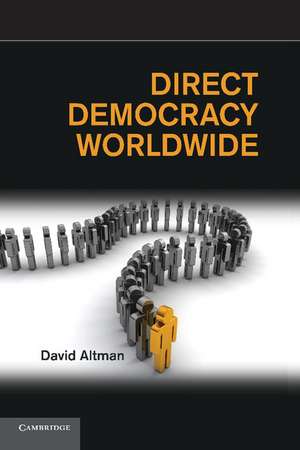Direct Democracy Worldwide
Autor David Altmanen Limba Engleză Paperback – 23 iul 2014
| Toate formatele și edițiile | Preț | Express |
|---|---|---|
| Paperback (1) | 281.38 lei 6-8 săpt. | |
| Cambridge University Press – 23 iul 2014 | 281.38 lei 6-8 săpt. | |
| Hardback (1) | 709.70 lei 6-8 săpt. | |
| Cambridge University Press – 19 dec 2010 | 709.70 lei 6-8 săpt. |
Preț: 281.38 lei
Nou
53.87€ • 55.40$ • 44.69£
Carte tipărită la comandă
Livrare economică 20 februarie-06 martie
Specificații
ISBN-10: 1107427096
Pagini: 266
Ilustrații: 19 b/w illus. 2 maps 17 tables
Dimensiuni: 155 x 235 x 16 mm
Greutate: 0.41 kg
Editura: Cambridge University Press
Colecția Cambridge University Press
Locul publicării:New York, United States
Cuprins
1. Direct democracy at the turn of the century; 2. Terms of the debate surrounding direct democracy; 3. Myths and facts behind the use of mechanisms of direct democracy: a worldwide analysis; 4. Direct democracy within non-democratic regimes; 5. Direct democracy within weak democracies: some cases from Latin America; 6. Direct democracy within democracies: the case of Uruguay (historic evolution, and voting behavior); 7. Uruguayan citizen-initiated mechanisms of direct democracy as agents of vertical accountability; 8. Conclusions.
Recenzii
Descriere
Challenging the common assumption that models of direct democracy and representative democracy are necessarily at odds, Direct Democracy Worldwide demonstrates how practices of direct and representative democracy interact under different institutional settings and uncovers the conditions that allow them to coexist in a mutually reinforcing manner. Whereas citizen-initiated mechanisms of direct democracy can spur productive relationships between citizens and political parties, other mechanisms of direct democracy often help leaders bypass other representative institutions, undermining republican checks and balances. The book also demonstrates that the embrace of direct democracy is costly, may generate uncertainties and inconsistencies, and can be manipulated. Nonetheless, the promise of direct democracy should not be dismissed. Direct democracy is much more than a simple, pragmatic second choice when representative democracy seems not to be working as expected. Properly designed, it can empower citizens, breaking through some of the institutionalized barriers to accountability that arise in representative systems.

